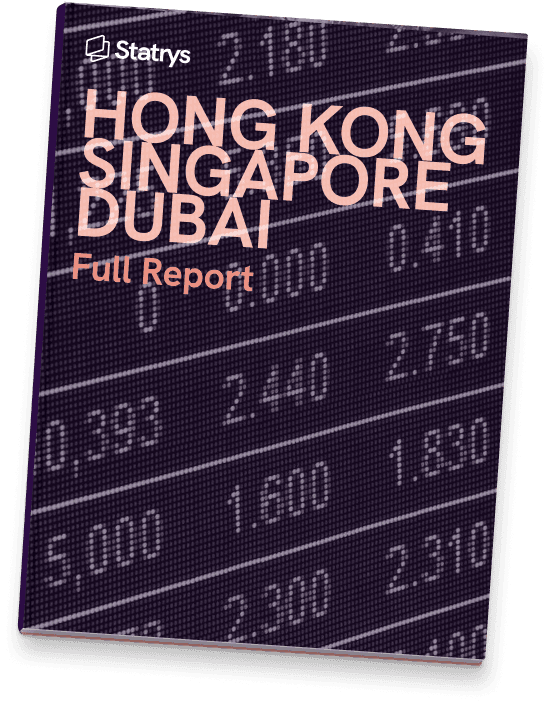HONG KONG
SINGAPORE
DUBAI
2024 Report
As interest in business incorporation continues to rise across Asia and the Middle East, this report takes a closer look at the business environments in Hong Kong, Singapore, and Dubai. Each of these regions offers unique benefits and faces distinct challenges, making them attractive yet different options for entrepreneurs and business owners. Hong Kong is known for its strong financial infrastructure and tax benefits, while Singapore is recognized for its efficiency and regulatory clarity. Dubai, on the other hand, offers strategic advantages through its free zones.
In this report, we not only provide a comparative analysis of the economic landscapes and regulatory frameworks of these three key jurisdictions but also include data from Statrys' survey and secondary research. Our aim is to equip entrepreneurs and business owners with valuable insights to help them make informed decisions on where to establish their operations.
Looking ahead, each of these regions is adapting to global economic shifts in unique ways:
- Hong Kong is reinforcing its role as an international financial hub, leveraging its strong legal system and strategic position between East and West.
- Singapore is building a robust ecosystem for startups and digital innovation, supported by government policies and world-class infrastructure.
- Dubai is rapidly evolving into a global business and tourism hub, driven by ambitious development projects and investor-friendly policies.
However, each location faces unique challenges:
- Hong Kong navigates political uncertainties and regional competition.
- Singapore faces challenges related to land scarcity and the need for continuous economic innovation.
- Dubai needs to balance its rapid urban development with resource management and economic diversification.
Incorporation Speed
Hong Kong and Singapore offer the quickest incorporation; Dubai’s free zones are fast, though mainland is slower. Digital platforms streamline processes.
Regulatory Environment
Hong Kong and Singapore have business-friendly climates with clear guidelines. Dubai's regulations are more complex. All have strong anti-corruption frameworks.
Banking Services
Hong Kong and Singapore are leading financial hubs. Dubai's financial landscape is evolving. Fintech innovation is transforming the sector globally.
Taxation
Hong Kong and Dubai offer attractive tiered tax systems, with Hong Kong's 8.25% on the first HKD2M and Dubai's 0% initial rate rising to 9%. Singapore’s flat 17% rate suits established companies.
Workforce
Singapore and Dubai have large, diverse talent pools, while Hong Kong offers a balanced workforce. Labour costs and work permit requirements vary significantly, affecting hiring decisions.
Expatriate Life
Hong Kong, Singapore, and Dubai offer high living standards and safety, though at a cost. Each city also has strong international communities and unique strengths in healthcare and education.
Recommendations
When deciding where to incorporate, companies should carefully evaluate the regulatory environment and business incentives in each jurisdiction, ensuring these align with their long-term strategic goals.
Future Outlook
Each jurisdiction's trajectory will be shaped by unique factors. Hong Kong's integration with the Greater Bay Area, Singapore's innovation in fintech and sustainable technologies, and Dubai's economic diversification and focus on emerging industries.
Companies should monitor these developments alongside broader economic, regulatory, and geopolitical shifts in Asia and the Middle East to make informed long-term decisions.
Legal and
Regulatory
Environment
Understanding both the incorporation processes and regulatory compliance requirements is important when entering new markets. This section provides a comparison of the incorporation timelines, costs, and regulatory frameworks in Hong Kong, Singapore, and Dubai to help businesses make informed decisions.
Compliance is equally critical. Non-compliance can result in severe penalties and operational disruptions. Statrys' survey compares the incorporation speed and compliance time across these three jurisdictions, providing insights into the efficiency of each region.
Key Factors for Incorporation
Speed
Hong Kong and Singapore offer quick incorporation, with most businesses completing registration in just a few days. Dubai’s free zones are also efficient, typically finalising the process within a week.
Local Presence
Singapore and Dubai require a local director for mainland companies, while Hong Kong offers more flexibility in this regard.
Capital Requirements
Hong Kong and Singapore generally have minimal or no capital requirements, whereas Dubai’s requirements vary depending on the location and company type.
Incorporation Speed Comparison:
Businesses Completing Incorporation Within a Week
of respondents completed incorporation within a week.
of respondents completed incorporation within a week.
of respondents completed incorporation within a week.
Compliance Time Comparison:
Time Spent on Monthly Compliance Tasks
Hong Kong
70% of respondents report spending minimal time on monthly compliance tasks.
Singapore
68% of respondents report spending minimal time on monthly compliance tasks.
Dubai
69% of respondents report spending minimal time on monthly compliance tasks.
Incorporation Process Breakdown: How They Compare
Yes
Yes
Yes
"Choosing the right place to incorporate depends on your business needs. Singapore offers a quick, straightforward process and a strategic location in Asia. Hong Kong is ideal for international trade, offering competitive tax benefits and access to the Chinese market. Dubai’s free zones provide 0% - 9% corporate tax and full foreign ownership but involve a more complex setup. You need to choose the right free zone and plan for a potentially longer bank account opening process."

Head of Incorporation Services, Statrys
Banking and
Financial Services
Access to efficient banking and financial services is key to maintaining smooth business operations in any jurisdiction. This section explores the banking landscapes in Hong Kong, Singapore, and Dubai, comparing traditional and alternative banking options, account opening processes, and international banking services.
The quality of these services plays a pivotal role in financial management and business growth. Statrys' survey shows varying satisfaction levels with banking services in these regions, highlighting their influence on operational efficiency.
Key Insights into Regional Banking Services
Traditional and Alternative Banking
Hong Kong, Singapore and Dubai offer robust international banking services. However, Hong Kong and Singapore lead in digital banking, providing faster account openings and more user-friendly interfaces. Dubai is making progress but still lacks a comprehensive range of digital-only options.
Account Opening Process and Speed
Hong Kong and Singapore’s banks and alternatives have significantly reduced the time needed to open a business account. Both jurisdictions offer extensive remote financial services. Dubai’s account opening process is slower, particularly for remote operations, as digital banking options are still expanding.
Currency Flexibility
Hong Kong and Singapore offer greater flexibility in currency transactions compared to Dubai. Dubai has some restrictions, particularly on AED (Dirham) transactions, while the other two jurisdictions offer more liberal currency exchange and transaction policies.
Banking Services Satisfaction Comparison:
Satisfaction Levels By Jurisdiction
of respondents are highly satisfied with the banking services available.
of respondents are highly satisfied with the banking services available.
of respondents are moderately satisfied with the banking services available.
Regional Breakdown:
What Drives Satisfaction in Banking Services?
Hong Kong
Satisfaction is primarily driven by the service quality and digital capabilities, followed by fast account opening. Customer support is considered less important, though still valued to some extent.
Singapore
Satisfaction is evenly distributed across all factors, with fast account opening, service quality, customer support, and digital capabilities. This balance suggests that businesses in Singapore value a well-rounded banking experience.
Dubai
Customer support and service quality are the most significant drivers of satisfaction. Fast account opening and digital capabilities are important but have a lesser impact.
Banking and Financial Services Breakdown: How They Compare
The banking landscape in Singapore, Hong Kong, and Dubai is rapidly evolving, driven by digital transformation. Singapore and Hong Kong lead in digital banking innovation, with Dubai catching up quickly.
This shift is improving services but also creating challenges:
Account opening remains complex, especially for complex businesses.
Cross-border transactions still face hurdles in speed and cost, and transparency fees
Integration of banking with other financial services is becoming crucial.
Fintech solutions like Statrys are addressing these challenges by offering:
Faster, simpler account opening processes.
More efficient multi-currency management and international transfers.
Integration of banking with other business financial needs.
We expect to see more seamless cross-border financial operations as regulations evolve to accommodate new banking models. Businesses should seek financial partners that offer innovative solutions and can navigate the regulatory landscape across multiple jurisdictions.

Taxation
The taxation landscape significantly influences business decisions, shaping both incorporation choices and long-term financial strategies. Tax rates and overall fiscal policies can have a major impact on a company's profitability and competitiveness.
This section compares corporate tax rates and indirect taxation across Hong Kong, Singapore, and Dubai. It includes insights from a survey indicating that tax benefits are a key factor in business location decisions.
Tax Considerations for Business Location Decisions
Corporate Tax Rates
Hong Kong offers a competitive rate at 16.5%, while Singapore maintains a stable rate of 17%. Dubai's initial 0% rate is a significant incentive; however, Dubai now imposes a 9% corporate tax beyond certain thresholds.
Tax Incentives and Deductions
Hong Kong, Singapore and Dubai provide opportunities to reduce tax liabilities, but specific offerings vary. Hong Kong offers R&D tax deductions, while Singapore provides extensive tax holidays for certain industries.
Indirect Taxation
Hong Kong's absence of GST/VAT contrasts with Singapore's impending increase. Dubai currently has a 5% VAT.
Business Location Preferences:
The Role of Tax Benefits
of the respondents chose Hong Kong for its tax benefits (low corporate tax rate, simple tax system)
of the respondents chose Singapore for its tax benefits (low corporate tax rate, attractive tax incentives)
of the respondents chose Dubai for its tax benefits (zero corporate tax rate, no personal income tax)
Tax Filing Across Jurisdictions:
How Easy Is It?
Hong Kong
77% say tax filing is straightforward
Singapore
80% say it's very easy to file taxes
Dubai
No corporate tax filing is required due to the 0 corporate tax rate
Taxation Landscape Breakdown: How They Compare

Inland Revenue Department (IRD)

Inland Revenue Authority of Singapore (IRAS)

Ministry of Finance
Tax optimization opportunities vary across these jurisdictions. Hong Kong offers a plethora of tax exemptions and deductions, especially for trading and financial services; Singapore offers generous tax incentives for research and development activities and is a hub for innovation-based businesses; Dubai tries to attract as much foreign capital as possible, and offers tax holidays and exemptions for specific industries.
Any individual business will find one jurisdiction more advantageous than the other two, depending on its activities, income sources and ambition.
KH
Owner, Kriminil Trading
Workforce
Considerations
Access to talent and the broader labour environment significantly impact business operations when expanding into new markets. The availability of skilled workers, labour laws, and employment costs can significantly impact a company's operational efficiency and growth potential.
This section compares key workforce factors in Hong Kong, Singapore, and Dubai, focusing on talent availability, labour laws, and employment costs. According to Statrys' survey, Singapore leads in the ease of finding and retaining talent, followed by Dubai and Hong Kong.
Workforce Dynamics in Global Hubs
Local vs. Expatriate Workforce Balance
Hong Kong and Singapore maintain a balanced workforce. In contrast, Dubai relies heavily on expatriate workers offering access to a diverse international talent pool but potentially increasing dependency on expatriate labour.
Employment Protections and Benefits
Hong Kong and Singapore provide strong employment protections and mandatory benefits. Dubai, however, offers moderate protections and relies on end-of-service gratuity rather than a provident fund system, which may offer more flexibility but less security for employees.
Specialisations and Talent Pool
Hong Kong specialises in finance, trade, and professional services with a highly skilled, finance-focused talent pool. Singapore has a tech-savvy workforce excelling in tech, finance, and biotech. Dubai’s diverse talent pool is growing in hospitality, finance, and oil & gas.
Overall Satisfaction With Local Labour Market
of respondents are satisfied with the local labour market.
of respondents are satisfied with the local labour market.
of respondents are satisfied with the local labour market.
Regional Breakdown:
What Drives Satisfaction in the Workforce Considerations
Hong Kong
Satisfaction is driven equally by the ease of navigating labor laws and the manageable labor costs, with a slight edge in the ease of finding and retaining talent.
Singapore
The ability to find and retain talent is a strong point, matched by satisfaction with labor costs and navigating labor laws.
Dubai
Labor cost is a more significant factor in driving satisfaction, followed closely by ease of finding and retaining talent. Navigating labor laws is seen as slightly more challenging compared to the other regions.
Workforce Factors Breakdown: How They Compare
50% local50% foreign
60% local40% foreign
20% local80% foreign
Hong Kong has a strong labor market with skilled professionals in finance, technology, and logistics. The workforce is multilingual and well-supported. Singapore's market focuses on technology, finance, and healthcare, and benefits from government-led education initiatives. In Dubai, there is a cosmopolitan workforce excelling in construction, tourism, and finance, but it relies more on expatriates.
Employment regulations vary: Hong Kong's laws are simpler, Singapore's more regulated, and Dubai's regulations differ between mainland and free zones. Remote work is popular in Hong Kong and Singapore but less so in Dubai. In terms of cost, Hong Kong is the most expensive, followed by Singapore, while Dubai offers flexibility but may come with potential expatriate-related expenses.
LB
Expat Living and
Quality of Life
Quality of life and expat living conditions are vital for entrepreneurs and employees as they influence overall satisfaction, productivity, and the ability to thrive in a new environment. These factors ultimately affect decisions on where to relocate or establish a business.
Key considerations such as housing, healthcare, education, and cultural integration play a significant role in shaping these outcomes. This section compares living conditions in Hong Kong, Singapore, and Dubai, focusing on the elements that contribute an appealing environment for living and working.
Quality of Life Factors for Expats in Global Cities
Living Environment:
Singapore offers a high quality of life and top-tier infrastructure, but it is the most expensive city in Asia. Hong Kong follows as the second most costly, boasting a dynamic business environment. Dubai, however, is more affordable, particularly in housing and daily expenses, making it a more cost-effective choice.
Economic and Lifestyle Factors
Singapore leads in GDP and average salary, making it ideal for financial stability. Dubai, with a lower cost of living and higher safety, is appealing for those prioritizing affordability. Hong Kong remains a key financial hub with strong FDI and efficient transport.
Education and Healthcare
Singapore’s top healthcare and education systems, along with a low language barrier, make it a top choice for expatriates. Dubai offers a safer environment and favourable climate, while Hong Kong provides a strong academic environment but faces higher pollution and income inequality.
Overall Satisfaction Comparison with Expat Life
Satisfaction Levels By Jurisdiction
of respondents are satisfied with their expat life.
of respondents report satisfaction.
of respondents are satisfied with their expat experience.
Regional Breakdown:
What Drives Satisfaction in the Expat Life?
Hong Kong
Satisfaction is largely driven by lifestyle and culture, with cost of living and education also playing key roles. The healthcare system has a slightly lesser impact.
Singapore
Satisfaction is balanced across lifestyle, cost of living, education, and healthcare, indicating a well-rounded living environment.
Dubai
Lifestyle and cost of living are the top drivers, while education and healthcare contribute but with less emphasis.
Expat Life and Quality of Life Factors Breakdown: How They Compare
Expat Life and Quality of Life Experiences
Singapore's multicultural environment and competitive education system are significant draw factors for expatriate business owners. Matthew Murray, Managing Director of Sales Higher, relocated his business from Tokyo to Singapore over a decade ago, citing the quality of the environment for raising his daughter as a primary factor.

Olga, an entrepreneur who has lived in Dubai for 4.5 years, noted: 'In a world with so much economic and political instability, the UAE government has a bold vision and is doing everything it can to make the UAE the most attractive country to live and work. Not only is this working, it's creating incredible business opportunities.

Conclusion
Singapore is another prime destination, particularly for startups and tech companies. Known for its clear regulatory framework and robust support for innovation, Singapore provides a tech-savvy workforce and a balanced living environment with top-notch healthcare and education. While the country’s high cost of compliance and labour might challenge smaller businesses, its strong business culture and quality of life make it an attractive choice for expatriates and entrepreneurs alike.
Dubai presents a compelling option for companies seeking a tax-free environment and access to the Middle Eastern market. Dubai’s diverse and growing talent pool, especially in hospitality, finance, and oil & gas, is a significant draw. However, businesses must be prepared for Dubai’s evolving regulatory landscape and slower banking processes. The city excels in affordability and safety, making it an appealing choice for those prioritizing a cost-effective living environment. Yet, navigating cultural differences and the local legal system can be challenging for expatriates.
Continue reading
How to Start a Company in Hong Kong

This guide walks you through the process of setting up a company in Hong Kong. Understand the options for legal entities and the key documents you'll need.
Starting a Business in Singapore

This guide breaks down the steps to launch your company in Singapore. Explore different business structures and discover the essential documents required, whether you're a foreign entity or an entrepreneur.
